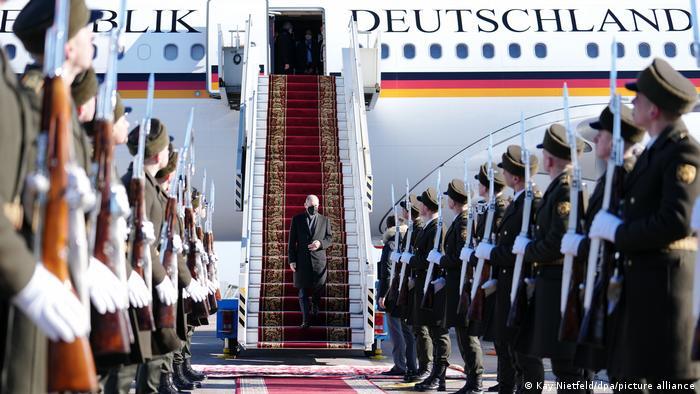Perizat RISBEK KIZI
German Chancellor Olaf Scholz has joined the search for a negotiated solution to the Ukrainian crisis: on Monday he met in Kiev with Ukrainian President Vladimir Zelensky, and on Tuesday in Moscow he meets with Russian President Vladimir Putin.
German-Ukrainian dialogue
On February 14, German Chancellor Olaf Scholz visited Ukraine for the first time as head of the German Cabinet and held two-hour talks with President Volodymyr Zelensky. The main outcomes of the talks between Scholz and Zelensky are listed below:
Scholz: Germany remains on the side of Ukraine
According to the Ukrainian president, the issue of building a new European security architecture, within which Ukraine will receive guarantees of its security, has become the main issue on the agenda of the dialogue.
Ukraine and Germany are united in the position of the insecurity of the escalation on the Ukrainian-Russian border for Europe and the world, despite different views on certain problems, President Volodymyr Zelensky said.
“Yes, Ukraine and Germany may have different views on certain issues, but we clearly agree that the escalation (…) constitutes an unprecedented and dangerous challenge for Europe and the world. Once again I was convinced of this by having a meaningful dialogue today with German Chancellor Olaf Scholz,” Zelensky wrote on his Facebook page.
The German leader, in turn, stressed that Germany remains on the side of Ukraine and is ready, like its NATO allies, to impose “the most serious sanctions” against Russia at any time if the country violates Ukraine’s sovereignty.
The importance of Normandy Four talks
At a press conference at the end of bilateral negotiations, Scholz focused on the settlement process in Donbass, welcoming the resumption of the dialogue in the Normandy format (Ukraine, Russia, Germany, France). For his part, Scholz said that Germany is trying to find a diplomatic solution to the situation around Ukraine. “Together with France, we have intensified our efforts in the Normandy format. It’s a difficult process, but I’m sure it’s worth the effort,” Scholz added, also calling on Kiev to engage in dialogue with Moscow.
He also stressed that Western countries are also interested in continuing the dialogue with the Russian Federation.
Economic support to Ukraine
Scholz noted that Germany supports Ukraine “in word and deed”. He stressed that no other country in the world has supported Ukraine so strongly financially over the past 8 years.
“I am delighted to be able to announce today an early disbursement of 150 million euros from the current unrelated financial loan. And I can announce a new unrelated financial loan,” he said.
Scholz stressed that there are strong economic relations between Ukraine and Germany and assured of further support for Ukraine, in particular, to encourage German investors.
Earlier it was reported that the EU Council supported the proposal of the European Commission to provide Ukraine with additional macro-financial assistance in the amount of 1.2 billion euros. This should speed up the final decision in the European Parliament.
A “serious dialogue” with Russia
After a visit to Kiev the day before, on February 15, talks began in Moscow between German Chancellor Olaf Scholz and Russian President Vladimir Putin. According to the Kremlin press service, the leaders of the two countries plan to discuss topical issues on the bilateral and international agenda, including issues related to Moscow’s proposals for security guarantees and the settlement of the Ukrainian conflict. As the press secretary of the President of Russia Dmitry Peskov clarified, in addition to these aspects, the negotiations will also touch upon the issue of Nord Stream 2. According to experts, the key topic of negotiations for Moscow will be the provision of long-term security guarantees for Russia, while Berlin is likely to focus on the Ukrainian problem. As Vladimir Shapovalov, deputy director of the Institute of History and Politics at Moscow State Pedagogical University, noted in an interview with RT, Vladimir Putin’s and Olaf Scholz meeting “will be extremely important”.

